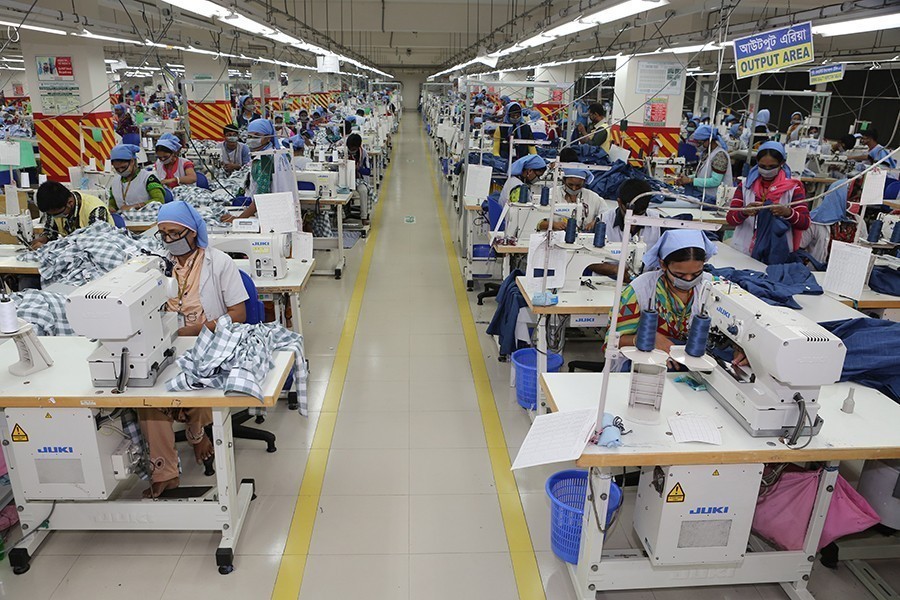A visiting European Union (EU) mission on Monday started reviewing the progress Bangladesh has so far made on human rights and labour standards.
As part of the follow-up mission on EBA (Everything but Arms)/National Action Plan (NAP) progress, sources said, the delegation held meeting with the technical committee in this regard.
Last November, Bangladesh sent a time-bound action plan to the International Labour Organisation (ILO) specifying suggested actions, mainly to sustain existing trade benefit under the EU's Generalised Scheme of Preferences.
The four-member delegation, led by Jordi Curell Gotor, director for international affairs in the Directorate-General for Employment, Social Affairs and Inclusion of the EU, will sit with trade unionists today (Tuesday).
They will also sit with the Bangladesh Garment Manufacturers and Exporters Association (BGMEA) and Bangladesh Knitwear Manufacturers, and the Exporters Association (BKMEA) the same day to have the largest foreign currency-earning sector's overview.
On Wednesday, the delegation will hold a discussion with top officials from commerce, labour and foreign ministries, sources said.
Talking to the FE, BKMEA vice-president Fazlee Shamim Ehsan said they would discuss, among others, safeguard measures that the apparel industry might face once the proposed EU GSP 2024-34 takes effect.
As per the proposed provisions, Bangladesh is found to be the only Asian graduating LDC whose textile and clothing exports could potentially be subject to the EU safeguard measures, resulting in their removal from GSP+ preferences.
The EU is the largest export destination of local products, especially ready-made garment.
More than 61 per cent or $19.43 billion RMG out of total $31.45 billion garment exports destined to the EU in last fiscal year, according to official data.
A ministry official says the EU has closely been monitoring the labour rights situation here since the 2013 Rana Plaza collapse.
They have been pressing for human rights, environmental issues and child labour eradication in recent years.
Since then, Bangladesh has taken multiple measures in line with the EU recipe that includes further reform of labour law and rules, according to the official.
The country has also made necessary changes in Export Processing Zones (EPZ) Act, he cites.
It is committed to eliminating child labour, one out of the nine EU suggestions, by 2025, the adds.
The government has also decided to ratify the ILO Convention 138 on minimum age.
Industry people, however, say with its graduation, Bangladesh needs to uphold 27 international conventions on human rights, labour rights, environment and good governance to be eligible for the EU GSP Plus facility.
Getting this facility will not be possible for Bangladesh unless it makes improvements not only in labour rights but also in human rights and environment issues, they add.
A visiting European Union (EU) mission on Monday started reviewing the progress Bangladesh has so far made on human rights and labour standards.
As part of the follow-up mission on EBA (Everything but Arms)/National Action Plan (NAP) progress, sources said, the delegation held meeting with the technical committee in this regard.
Last November, Bangladesh sent a time-bound action plan to the International Labour Organisation (ILO) specifying suggested actions, mainly to sustain existing trade benefit under the EU's Generalised Scheme of Preferences.
The four-member delegation, led by Jordi Curell Gotor, director for international affairs in the Directorate-General for Employment, Social Affairs and Inclusion of the EU, will sit with trade unionists today (Tuesday).
They will also sit with the Bangladesh Garment Manufacturers and Exporters Association (BGMEA) and Bangladesh Knitwear Manufacturers, and the Exporters Association (BKMEA) the same day to have the largest foreign currency-earning sector's overview.
On Wednesday, the delegation will hold a discussion with top officials from commerce, labour and foreign ministries, sources said.
Talking to the FE, BKMEA vice-president Fazlee Shamim Ehsan said they would discuss, among others, safeguard measures that the apparel industry might face once the proposed EU GSP 2024-34 takes effect.
As per the proposed provisions, Bangladesh is found to be the only Asian graduating LDC whose textile and clothing exports could potentially be subject to the EU safeguard measures, resulting in their removal from GSP+ preferences.
The EU is the largest export destination of local products, especially ready-made garment.
More than 61 per cent or $19.43 billion RMG out of total $31.45 billion garment exports destined to the EU in last fiscal year, according to official data.
A ministry official says the EU has closely been monitoring the labour rights situation here since the 2013 Rana Plaza collapse.
They have been pressing for human rights, environmental issues and child labour eradication in recent years.
Since then, Bangladesh has taken multiple measures in line with the EU recipe that includes further reform of labour law and rules, according to the official.
The country has also made necessary changes in Export Processing Zones (EPZ) Act, he cites.
It is committed to eliminating child labour, one out of the nine EU suggestions, by 2025, the adds.
The government has also decided to ratify the ILO Convention 138 on minimum age.
Industry people, however, say with its graduation, Bangladesh needs to uphold 27 international conventions on human rights, labour rights, environment and good governance to be eligible for the EU GSP Plus facility.
Getting this facility will not be possible for Bangladesh unless it makes improvements not only in labour rights but also in human rights and environment issues, they add.


